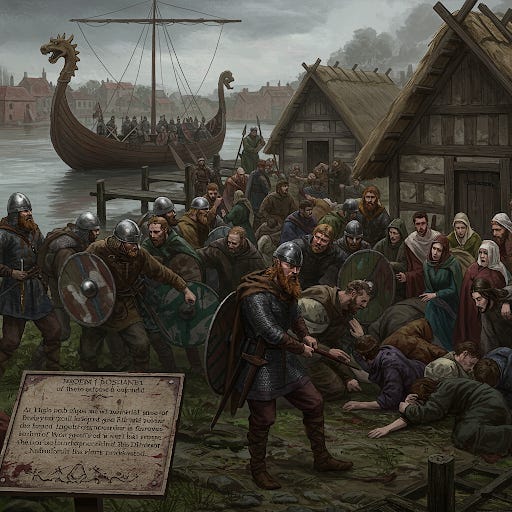A Tale of Two Plaques.
Honouring the Philanthropist, Ignoring the Plundered: A Bristolian Balancing Act.
The unveiling of a commemorative plaque to Edward Colston in Bristol, as diligently reported by the Bristol Post, serves as a poignant reminder of the city's enduring commitment to historical remembrance, selective as it may be. One cannot help but admire this dedication to acknowledging figures whose legacies, shall we say, possess a certain… complexity.
This civic enthusiasm for brass-plated history, however, raises a rather awkward question for the geographically inclined and historically aware. While Bristol rightly grapples with the shadow of its slaving past, one wonders if the echoes of other, equally unpleasant, historical realities are deemed less worthy of metallic commemoration.
Consider, if you will, the less celebrated narrative of our very own West Country folk – the sturdy Anglo-Saxons and perhaps even some early "Bristolians" – who found themselves on the less glamorous end of a forced relocation program courtesy of our esteemed Norse visitors. These were not willing tourists seeking the vibrant cultural scene of 9th and 10th century Dublin. Instead, they were often the spoils of raiding parties, dragged across the Irish Sea to serve as chattel in Viking settlements.
One imagines the scene: terrified individuals, snatched from their homesteads in what is now Bristol and its surrounding verdant lands, bundled onto longships, and subjected to the tender mercies of men whose primary interest lay not in charitable donations but in raw human capital. Did these unfortunate souls not contribute to the rich tapestry of history, albeit as threads forcibly woven into someone else's design?
Perhaps a modest plaque near the docks, not far from its newly unveiled counterpart, could offer a more holistic view of Bristol's historical entanglements. Something along the lines of:
"Hereabouts, in the less-documented centuries, many inhabitants of this region were forcibly taken by Viking raiders and transported to Dublin, contributing, against their will, to the economy and social fabric of the Hiberno-Norse settlements. Their suffering, though unrecorded in ledger books of local merchants, deserves a moment of quiet contemplation."
It might not have the same ring as quasi-celebrating a "philanthropist," but it would certainly offer a more comprehensive, if considerably less flattering, picture of Bristol's historical connections to the slave trade, in all its diverse and uncomfortable forms. After all, equality in remembrance, even of unpleasant truths, should surely extend beyond the conveniently selective.



